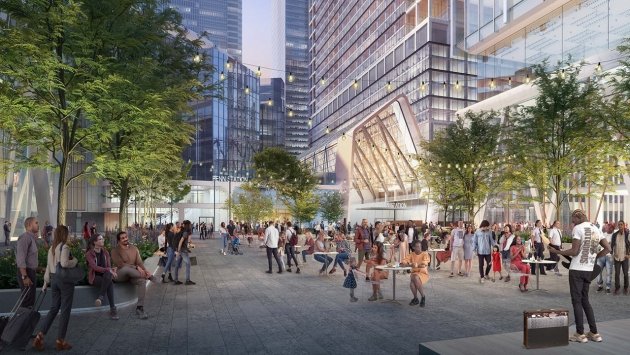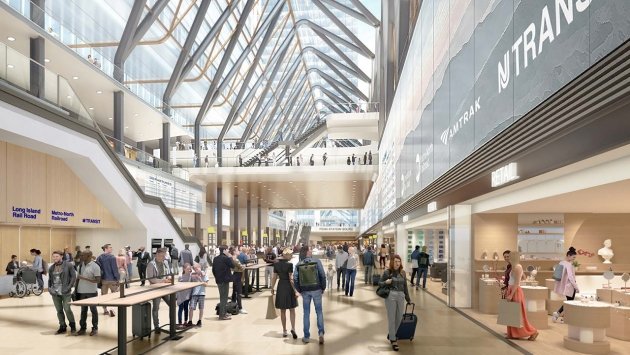Penn Station developer backs off $22 billion project after years working behind the scenes with NY governor
Nov. 4, 2022, 3:28 p.m.
Executives at the company previously expressed a willingness to do the “dancing” to the state’s narrative. Suddenly, that’s changed.

A real estate giant’s unexpected decision this week to back off its key role in the $22 billion redevelopment of Penn Station marks a stunning split from the governor’s office after years of behind-the-scenes collaboration, newly disclosed emails show.
On Tuesday, Vornado CEO Steven Roth said in a conference call with investors that now is not a good time for development of sites it owns in the West 30s around the Penn Station site. Property tax revenue from new buildings on those sites is a key component of the state’s plan to finance the $22 billion overhaul of the station and surrounding area.
“I must say that the headwinds in the current environment are not at all conducive to ground up development,” said Roth, who has donated nearly $100,000 to the campaigns of Gov. Kathy Hochul and her running mate, Lt. Gov. Anthony Delgado.
Roth’s comments are a stark change in tone from the company that has enjoyed a cozy relationship with the governor and the state’s chief economic development agency, Empire State Development. The company’s close ties to state government were revealed last week in a lawsuit challenging the Penn Station project.
In January 2018, then-Gov. Andrew Cuomo had tapped the company to play a key role in the project, which could displace 214 residents and transform the country's busiest rail station.
“I understand the governor has directed us to sit with you as soon as possible to advance discussions at Penn Station,” the senior vice president of Vornado at the time, Marc Ricks, wrote to senior ESD officials.
By early 2021, Vornado and top officials at ESD were discussing how to handle scrutiny as Cuomo began presenting plans publicly.
“And so it begins,” ESD Vice President Holly Leicht wrote in a Feb. 4, 2021 email to Vornado executives after Layla Law-Gisiko, a member of Manhattan Community Board 5, requested a meeting with the private developer about the project.
By the end of the year, Vornado executives were pushing back on a desire from Hochul’s office to look “afresh” at the project’s impact on Seventh Avenue. The plan proposes a significant expansion of the station and a new entrance along 7th Avenue between West 30th and West 31st streets.
“Vornado is not prepared to say that we will look at it afresh. The new canopy is ordered,” Vornado consultant Judy Kessley wrote on Nov. 3, 2021.
In the same thread, Vornado executive Barry Langer said he was willing to do the “dancing” for a “narrative” pushed by ESD executive Holly Leicht. Details of that narrative were not clear in nearly 1,000 pages of emails.

It wasn’t until July of this year that the financing plan for the project was approved by the state’s Public Authorities Control Board – despite criticism that the process had been jammed through with minimal transparency.
Law-Gisiko, the community board member who reached out to the development team last year, said the emails revealed “contempt” for the public.
“The notion that it is us against them, the idea that ESD and Vornado were so cozy in their relationship and that they were going to work together almost as a joint venture against the community,” Law-Gisiko told Gothamist. “And it is really disappointing because the job of government is really to reach out and find points of agreement and commonalities and try to resolve differences.”
The emails were included in a lawsuit filed by attorney Charles Weinstock alleging that ESD is withholding emails that it should disclose under the state’s Freedom of Information Law. Weinstock filed a separate lawsuit last week alleging the state bypassed environmental law and other regulations to get the plan approved.
Matthew Gorton, a spokesperson for ESD, said the state was moving forward with the project, despite Roth’s comments on the shareholder call.
“Quarterly conditions may fluctuate, but Gov. Hochul’s commitment to revitalizing Penn Station and the area surrounding it will not,” Gorton wrote in a statement. “We have always said that this was a long-term project – to be built out over more than a decade – designed to withstand temporary market adjustments and that the revenues generated through redevelopment were just one of several funding sources to support the reconstruction of Penn.”
Vornado similarly downplayed any discord.
“We are 100% committed to our plans for the Penn District,” a company spokesperson said.
“We are confident that the Penn District will become the new center of New York and an extraordinary success.”
The project aims to upgrade Penn Station’s cramped, cavernous conditions with a new concourse and to erect 10 new skyscrapers across eight sites in the neighborhood. The plan would also expand the station a block south of West 31st Street by razing buildings between Seventh and Eighth avenues.
State officials planned to collect money from Vornado for the new skyscrapers to help fund the station’s reconstruction, rather than property taxes on the buildings.
But the fiscal watchdog Reinvent Albany questioned how the project could move forward without Vornado’s new buildings.
“The emperor has no clothes, and so the state needs to look to transparent, solid sources of revenues like state capital appropriations and federal grants to fund the project, and come up with a real financial plan that doesn't include massive tax breaks for real estate developers,” said Rachael Fauss, a senior policy analyst with Reinvent Albany.